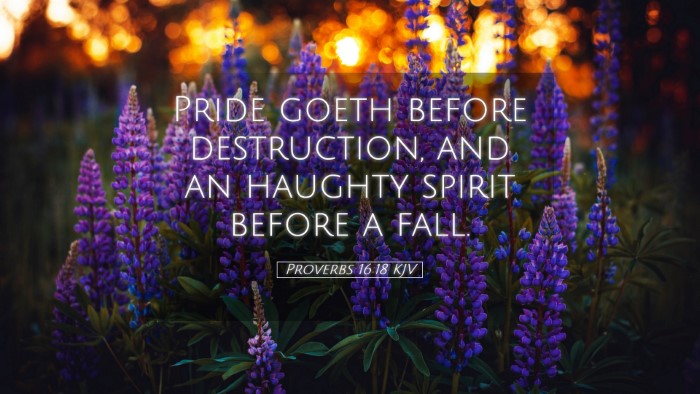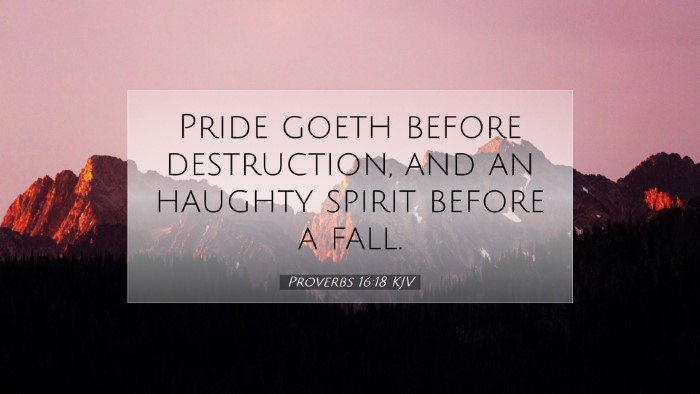Commentary on Proverbs 16:18
Text of the Verse: "Pride goeth before destruction, and a haughty spirit before a fall." (Proverbs 16:18 KJV)
Introduction
Proverbs 16:18 serves as a stark warning about the nature of pride and arrogance. This verse encapsulates a profound truth that resonates throughout Scripture: the perilous consequences of an inflated self-perception.
In this commentary, insights from notable public domain scholars like Matthew Henry, Albert Barnes, and Adam Clarke will converge to provide a comprehensive understanding of this vital proverb.
Contextual Overview
Proverbs is a book rich in wisdom literature, offering practical advice for living a life that honors God.
Chapter 16 specifically deals with the sovereignty of God in human affairs, highlighting the importance of humility.
The verses surrounding 16:18 also speak to the futility of relying on one's own understanding and the ultimate need to submit to divine guidance.
Exegesis of Proverbs 16:18
Matthew Henry expounds on the idea that pride is the root of many vices and represents a significant barrier to spiritual growth.
He notes the transition from pride to destruction is not merely metaphorical; it's a pattern observed in the lives of many who set themselves against God.
This verse serves as a principle applicable to individuals, nations, and even church communities.
- Pride Defined: This term encompasses not only self-exaltation but also an insubordinate attitude towards God.
- Consequences of Pride: Henry illustrates through historical examples how pride has led to the downfall of kings, nations, and individuals.
Commentary on Key Terms
Albert Barnes provides clarity on the key terms in this verse:
- "Pride": Encompasses an overestimation of oneself that leads to a disregard for others. This form of arrogance is positioned to invite calamity.
- "Destruction": Refers not only to physical ruin but spiritual and relational collapse. When one elevates oneself, they can expect a fall.
- "Haughty spirit": This term suggests a mindset that scoffs at humility and God’s authority, often culminating in an ominous downfall.
Theological Implications
Adam Clarke emphasizes the theological ramifications of pride against the holiness of God.
He notes that pride is a sin that God actively opposes: "For God resisteth the proud, but giveth grace unto the humble" (James 4:6). This divine principle underlines the necessity of humility in the life of a believer.
Applications for Life and Ministry
Understanding and applying Proverbs 16:18 has significant implications for pastors, students, and theologians in their respective contexts.
- Self-Examination: Individuals are encouraged to assess their motives and attitudes. Regular self-reflection can prevent pride from taking root.
- Ministry Practices: Leaders in the church must strive for humility, recognizing that their strengths are gifts from God, not products of their own making.
- Community Dynamics: Building a culture within the church that values humility can foster deeper relationships and guard against division.
Conclusion
Proverbs 16:18 serves as a powerful reminder of the danger of pride and the importance of maintaining a humble spirit.
The insights from Matthew Henry, Albert Barnes, and Adam Clarke provide a multifaceted understanding of this verse that is applicable to both individual lives and broader community dynamics.
As believers, the call is clear: to walk in humility, to acknowledge our dependence on God, and to embrace the grace that is afforded to those who recognize their own limitations.


